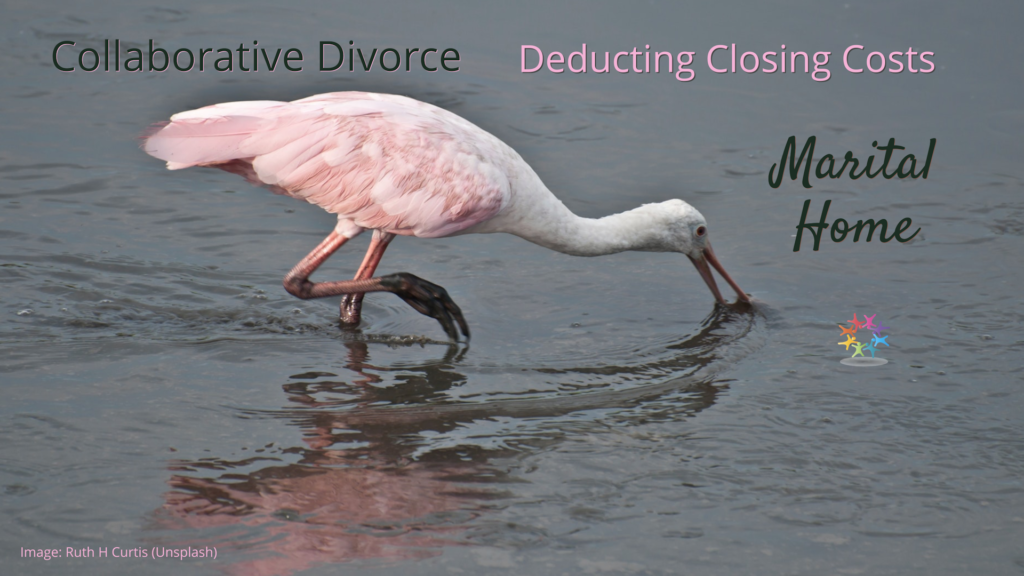Imminent Sale Doctrine – Closing Costs in Florida Divorce
By Michael P. Sampson Sampson Collaborative Law, March 16, 2025 Divorce can feel overwhelming, especially when it’s time to divide the marital home. In Florida, whether realtor fees and closing costs come off its value depends on the Imminent Sale Doctrine and solid evidence. Courts stick to strict guidelines, but the collaborative process offers couples flexibility. Let’s explore the imminent sale doctrine, considering fees, closing costs, and tax consequences on the sale of marital residence. What’s at stake? How might you move forward? What if there is no imminent sale? Closing Costs and Realtor Fees: The Imminent Sale Doctrine: Evidence In Florida, splitting property in divorce follows section 61.075, Florida Statutes. The Imminent Sale Doctrine acts like a checkpoint at an airport —only those with a boarding pass (proof of an impending sale) can get through the gate to deduct realtor fees or closing costs. Without it, the distribution value of the marital residence stands firm, with no such deductions. Florida courts have shaped this standard. They say, for the judge to deduct these fees and closing costs from the value of the marital residence, there must be proof of an “imminent sale” – one about to happen – and reliable cost estimates. For example, in Goodwin v. Goodwin, 640 So. 2d 173 (Fla. 1st DCA 1994), the First District Court of Appeal held: “The estimated cost of selling may be deducted from the value of the property where there is evidence as to the estimated sale costs.” The court cited a foreclosure case, Savers Federal Savings and Loan Ass’n v. Sandcastle Beach Joint Venture, 498 So. 2d 519 (Fla. 1st DCA 1986), and a divorce case, Taber v. Taber, 626 So. 2d 1089 (Fla. 1st DCA 1993). Savers Federal Savings and Loan Ass’n v. Sandcastle Beach Joint Venture: Failure to Consider Sales Costs In the foreclosure case, Savers Federal Savings and Loan Ass’n, the First DCA received a real estate appraiser’s expert opinion about the fair market value of condo project. The S&L foreclosed on the project, then sought a deficiency judgment for the difference between the foreclosure sale price and the FMV of the project. The trial judge denied the lender’s deficiency claim based on a finding the value of the property on the date of the foreclosure sale exceeded the debt owed. But the judge accepted an overstated value for the property, by not considering sales costs. The appraiser used two different appraisal methodologies – the cost approach and the market analysis approach. Both approaches assumed imminent sale of the units. Under the cost approach, he arrived at a replacement cost for the condo units as new, less depreciation, and adjusted that for profit, overhead, and the owner’s paying selling costs to individual purchasers over 18 months. Under the market approach, the expert compared the subject townhouses to sales of similar units. He arrived at a gross price, then presumed the seller would sell each unit individually over 18 months based on then-current sales rates. Under both approaches, the expert testified items that hadn’t yet occurred, including sales expenses, should come off the value. The judge acknowledged the condo project would be sold – an implicit imminent sale – yet failed to deduct associated sales costs. That was wrong. Taber v. Taber – No Imminent Sale In contrast, in Taber, the divorce case First DCA cited in Goodwin, the court considered if the trial court abused its discretion by awarding the former husband an unequal distribution of marital assets. There, a real estate agent testified about the fair market value of the marital home. Then the judge deducted closing costs at .083 percent to which a real estate sales expert testified. Yet there was no evidence of an imminent sale of the home. The Taber court reasoned: In determining the value of real estate, it is entirely appropriate to deduct the estimated cost of selling the property where the value of the property is based on the prospective sale of the property, and the witness as to value indicates such a deduction is appropriate. Savers Fed. Savings and Loan Ass’n v. Sandcastle Beach Joint Dev., 498 So. 2d 519 (Fla. 1st DCA 1986). Absent such evidence, however, a further deduction of value for selling costs is inappropriate. Shaw v. Charter Bank, 576 So. 2d 907 (Fla. 1st DCA 1991). In the instant case, there appears to be no evidence that sale of the property was imminent or that the value was based solely on the ability to sell the property. It is, therefore, unclear from the record on what basis the judge allowed a deduction for closing costs. Reed v. Reed – 2025 – No Imminent Sale – Deducting Closing Costs Disallowed Following Taber, the court in Reed v. Reed, Case No. 4D2023-2584 (Fla. 4th DCA Feb. 19, 2025) likewise tossed out an 8% closing cost deduction. No sale was planned, unless the former wife’s payment default triggered a sale. Speculative Evidence Won’t Cut It Under the imminent sale doctrine, guessing at realtor fees and closing costs when no sale is imminent is like planning a grocery budget without a shopping list. It’s so much guessing and wandering up and down the aisles. Courts don’t allow that without competent substantial evidence to support deducting these fees and costs. Instead, judges follow a clear line: no deduction without solid evidence of an imminent sale or court order, as seen in Reed and Goodwin. In Reed, the wife wanted to keep the home and property on which she ran a bed and breakfast for years, so no sale was imminent. The court disallowed an 8% cost cut, unless she missed a deadline for paying an equalizing payment. Daubert – Expert Opinions Must Be Based on Data Not Hunches Solid evidence to support claimed deductions isn’t just a suggestion—it’s key. Regarding expert opinion, Daubert v. Merrell Dow Pharms., Inc., 509 U.S. 579 (1993), raises the bar. This US Supreme Court case, the evidentiary standard from which Florida adopted, demands expert testimony be based on tested, reliable methods, not on guesses. See Section 90.702, Florida Statutes; In re Amendments to the Florida Evidence
Imminent Sale Doctrine – Closing Costs in Florida Divorce Read More »








